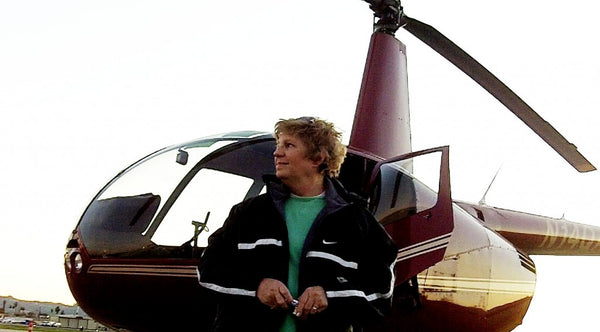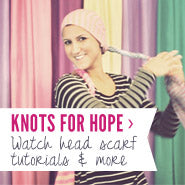Barbara From “Let Life Happen”


Whether it’s heartfelt anecdotes or inspiring triumphs, the Scarves Dot Net gals love to share stories — especially when they’re incredibly touching. That’s why we’ve started SDN Spotlight, a new series highlighting the most inspiring men and women from around the web.
In case you missed it, our first interview was with Ann Silberman, who opened our eyes to supporting breast cancer research all year long. Our second and most recent interview was with Angelo Merendino, who proved the power of love between a husband and a wife battling breast cancer.
Today’s interview brings us Barbara Jacoby, a strong-willed woman with a caring heart who battled both breast cancer and domestic abuse. Together with her husband, she created Let Life Happen as a light of support for others facing challenging life situations. We are thrilled to have Barbara speaking with us today, and we truly respect her sincere passion for helping others stay positive and feel empowered.
Read on for our interview with Barbara:

SDN: Could you give a brief introduction to our readers about you, your family, and your interests and hobbies?
Barbara: I am a two-time breast cancer survivor and domestic abuse survivor, but I never want to be defined by my past or this disease. I was born and raised in Pennsylvania and currently live in California with my husband, Kirk. We are a team. Our first project was a music CD titled Let Life Happen, which ultimately became the name for my website. My husband created my website for me after I was diagnosed with cancer for a second time. He continues to update and maintain it for me. He was my rock through the cancer and reconstruction, and he continues to support all of my efforts to help others. He even ran his first-ever 10K last month to raise funds for cancer research. He also ran to honor our social media friends who are survivors, those who are caregivers, and those who have lost their battle with cancer.
I also love college football. During the season, I am busy crocheting blankets that are donated through our company’s volunteer program to children in crisis.
SDN: When and how was your breast cancer discovered, and how did you and your family deal with the news?
Barbara: I discovered the lump for the first time during a routine self-exam and contacted the doctor the next day. I had surgery two and a half weeks later, which didn’t really allow for a chance to deal with anything other than the medical aspects in that short amount of time.
The second time it was discovered was during a mammogram, right before I was supposed to start radiation treatment for the first cancer. This one was tougher because my brother died on the operating table during his 12th cancer-related surgery, just three weeks before my double mastectomy. Few people, including my family, knew about what was happening, as I did not want to deal with the cancer and family and friends at the same time. I wanted to deal with the medical aspects and continue my work and life as normally as possible.
SDN: Can you briefly describe your journey as you battled breast cancer?
Barbara: I am a pretty private person, so I just worked my way through all of the doctors and testing on my own — except for one needle biopsy. A friend took me from our office to that appointment and picked me up after, and we had some dinner together before I got into my car to go home. My husband was there for each surgery and the first trip to the doctor’s office after each of the surgeries.
Other than that, I chose to be on my own. I think it was my way of feeling in control and not allowing cancer to rule my life or make me feel less empowered and independent. Equally important was my husband’s encouragement to write about whatever I wanted. It would be a way to share some of my innermost thoughts on a website that he would create. This ultimately became the best medicine and release for me.
SDN: How did others support you? What advice can you give for those who have a loved one facing this fight?
Barbara: I can’t begin to tell you the support that I received from those with whom I chose to share those journeys with — they all exhibited such perfect strength for me. The leader was my husband, who allowed me to be me. He offered to do anything I needed, but also allowed me to take control from there. He, and the few others who knew, honored my request that they not share the information with anyone else and offered to help in every way possible. They also knew when to step aside. This was perfect for me.
Although I was the one facing the cancer wars, I did not want advice or direction about what I should do from anyone. The reason for this is that each of my supporters were, in their own way, going through my battles, too. And had they suggested or pushed for a certain course of action — even if I was in agreement — and something went wrong, I would never want for them to feel guilty or take any sort of responsibility for the bad outcome.
As for anyone who has a loved one facing cancer, I think it’s most important to be there if you can, to help and listen. The hardest part about helping others is the potential to not be in a position to do all that is needed for someone else — but this doesn’t just apply to supporting someone with cancer. The most important thing is for the patient to have confidence in the medical personnel. If they are not comfortable with anyone, find someone else for them. A trusted medical team makes all of the difference in the patient’s belief in a successful outcome.
SDN: Are there any assumptions or misconceptions about breast cancer that you would like to shed some light on?
Barbara: That is a really great question, and one that I’ve never really thought about. I suppose the biggest misconception is if you don’t have a history of breast cancer in your family, you don’t have to be as concerned about it. Like most women, I do not have that history. I constantly hear things like, “If you eat well and exercise, you will improve your chances of not getting cancer.” I hear all kinds of recommendations about what you should eat and not eat, and what you should drink or not drink. My only comment is that no one knows what causes cancer and that is why we don’t have a cure. Good health is most important in warding off any disease, but speaking for myself and a lot of other people that I know who have dealt with breast cancer, there’s more to it than that.
The other point is that breast cancer is not just a women’s disease. Men do get breast cancer, too, so we need to keep an eye out for them.
SDN: What is a helpful online resource for those looking for information, answers, and support from others battling breast cancer?
Barbara: That is another really great question. Just five years ago when I was first diagnosed, there was nothing other than WebMD, which was so outdated that it was of absolutely no help. However, now there are so many resources. I suggest a person just search for whatever particular topic they wish, and they will find tons of resources. With that said, I do prefer Healthline.com, which covers information, answers, and support. This site is certainly a great place to start.
SDN: What can survivors do to help create awareness about breast cancer and the available resources out there?
Barbara: Just about anything that they want. There are so many opportunities to help that it has become almost necessary to compartmentalize this as well. All of the major sites have lots of information and are certainly doing everything under the sun to create awareness. The sad part is that many women won’t do anything about it because of fear. It reminds me of the old adage, “You can lead a horse to water, but you can’t make it drink.”
On a personal basis, I am working to help find funding for organizations like MyHopeChest.org, which is trying help women who want reconstruction after breast surgery, but don’t have insurance or the funds for such surgeries. Unless you have had your breast(s) removed, it is extremely difficult for someone to understand how this would affect a person physically, psychologically, and sexually. This is an area that is completely under-served by the current research organizations. After watching a woman with breast cancer go to her grave because of her refusal to give up her breasts in order to save her life, I cannot ignore this aspect of treatment.
SDN: You have used your site as a source of inspiration for others going through similar situations. What are you hoping that other women take away from Let Life Happen?
Barbara: My hope is that they know they are not alone. So many women have had family and friends vanish at this most critical time in their lives and they don’t know where to turn or what to do. I want them to know that I have walked in their shoes. I am here to listen to them. I am here to direct them to the resources I have discovered that may help them with their individual needs. I am here to keep them up-to-date to the best of my ability, regarding new studies and possible breakthroughs to review and discuss with their own doctors.
And I want them to know that there is always the power of positive thinking — it can change their individual experience with this disease. I know that cancer changes every single life forever, but it is up to the individual as to whether that change is a positive one.
SDN: You are a survivor of both breast cancer and domestic abuse. How did you find so much inner strength to be the inspiration that you are today?
Barbara: On the day that I left my abusive situation, I knew I would never have another bad day in my life. I was mentally abused, beaten, and had a loaded gun in my face on more occasions than I can count. I was promised that if I left, I would be hunted down and killed. It was at that point I realized that if I was hunted down and killed, it would be preferable to living one more day with the abuse. I survived that situation, and my abuser is now dead. I am free. Every day I wake up is automatically a great day. That is my philosophy.
As a result, when the cancer came along, it truly wasn’t a big deal to me. I knew it was something that needed to be dealt with, and I did so as each step in the process came along. I never thought of it as life threatening, but rather something from which I would learn. And boy, have I ever learned. I am so grateful for all of the wonderful people who I have met, what I have learned about social media, and most importantly, what I have learned about myself. These are lessons that I know I could never have learned any other way.
***
To hear more about Barbara’s inspirational story, you can view her video here and check for updates on her website.
Be sure to reach out to her on Facebook and Twitter, too.
Thank you so much for sharing with us, Barbara!
There's no place like home! Take me back to ScarvesDotNet.











